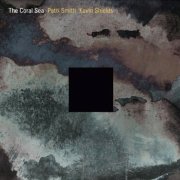 With the temperature dropping, it's time to find someone to keep you warm. Find your hookups with our online dating guide!
With the temperature dropping, it's time to find someone to keep you warm. Find your hookups with our online dating guide!
- Spoken word
- 2008
- Buy the CD
Reviewed by Lee Zimmerman
With that said, Smith’s collaboration with My Bloody Valentine guitarist Kevin Shields comes into context. Recorded live in concert at London’s Queen Elizabeth Hall in June 2005 and September 2006, the double-disc The Coral Sea finds Smith reading her elegiac tribute to photographer, friend and former lover Robert Mapplethorpe to the instrumental backdrop provided by Shields’ layered, atonal guitar drones. The mood is unshakably melancholic and yet, it boasts grand designs. While Smith’s eloquent, articulate auditory is spellbinding in conveying both her grief and respect, it’s her words, filled with stark, descriptive phrasing and rich, vivid impressionism,that are especially affecting. A poem as passion play, it describes Mapplethorpe’s final voyage of abandon, a trip to see the Southern Cross and a glimpse into the heavens where Smith imagines he eventually finds himself.
Ultimately, The Coral Sea is a catharsis, for the poetess herself of course, but more than likely also for the English audience caught up in Smith’s majestic imagery. There’s optimism in the anguish, a sense that Mapplethorpe’s spirit has been freed from its mortal coil and risen to heights of greater enlightenment. Indeed, as the voyage reaches its final conclusion, Smith’s description of his final, freeing glance becomes a revelation of ultimate, unceasing joy, an ascent into heaven where all doors are open and eternal bliss is finally assured. Powerful stuff indeed.
Truth be told, even this most emphatic performance will be lost on anyone who’s inclined to limit themselves to only a casual listen. Two albums of spoken word and droning effects is a tough sell, after all. Still, those in a mood to be swayed by the wordplay will find themselves transfixed by the sense of wonder and anticipation. So too, longtime Smith aficionados may find some connection to her earliest works, specifically her album debut Horses, which found her poetic infusion running headlong into a volatile mix of attitude and amplitude. However, don’t be mistaken. Coral Sea isn’t a musical journey, even with Shields’ crested phrasing as the poem reaches its peak. Rather, it’s a requiem that swoons and sways like some ancient Greek epic, a fitting tribute to an artist and the artistry that Smith harbors within.
You can follow us on Twitter and Facebook for content updates. Also, sign up for our email list for weekly updates and check us out on Google+ as well.











